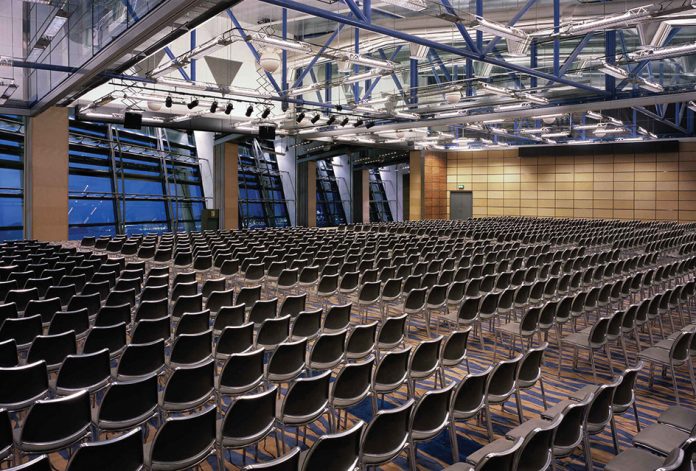With most events cancelled or rescheduled in the first half of this year due to the COVID-19 pandemic, 2020 means a hard year for the sector which takes time for recovery
The postponement of Global Gaming Expo (G2E) Asia, a major trade show for the gaming industry in the region held in Macau, not only explicates how the local gaming industry has been hit by the novel coronavirus (COVID-19) but it also sheds light on how the MICE sector (meetings, incentives, conferencing, exhibitions) has been embroiled in this global pandemic.
With the virus now spreading over 180 countries and regions and infecting hundreds of thousands of people, as well as leading to the shutdown of cities and travel restrictions in place, this public health emergency has brought the MICE sector to a standstill, locally and globally. With no signs of a major rebound in the first half of 2020, industry insiders believe it will take time for the sector to restore its sheen and glitz.
The American Gaming Association and Reed Exhibitions, the organisers of G2E Asia, announced in March that the trade show, which was originally scheduled to take place on 19-12 May, will be delayed to 28-30 July. “The coronavirus disease (Covid-19) outbreak and related travel and commercial restrictions make those preparations too difficult to hold the show as originally planned,” the organisers noted in a statement.
G2E Asia is just one among numerous MICE events that has been cancelled or postponed in the territory due to the virus spread. The 2020 Macao International Environmental Co-operation Forum & Exhibition, scheduled to be hosted on 26-28 March and organised by the Macau SAR Government, was cancelled and will only take place again next year. The 2020 UFI Asia Pacific Conference & Digital Innovation Forum, organised by the Global Association of the Exhibition Industry and hosted by the Macau Fair & Trade Association, will move from 4-6 March to 26-28 August.
According to the preliminary figures unveiled by the Macau Trade Investment and Promotion Institute (IPIM) earlier, which is in charge of MICE development, at least 180 events were cancelled or delayed in the first quarter of 2020, accounting for over 10 percent of the total number of MICE events held in the city per year. Government figures said a total of 1,536 MICE events were held in Macau in 2019 — including 1,459 meetings and conferences, 58 exhibitions, and 19 incentive events — up by 7.64 percent from the previous year.

“We originally expected that only about one-third of the events would be cancelled, but given the latest development [of the pandemic], about half of the events have been cancelled while the rest have been rescheduled” – Alan Ho Hoi Meng, chairman of the Macau Convention & Exhibition Association
Lower turnover
“As the virus has spread across so many countries and regions, it is invincible for the Macau MICE industry, which is susceptible to external changes, to be negatively implicated,” said Alan Ho Hoi Meng, chairman of the Macau Convention & Exhibition Association.
According to the veteran, basically all events scheduled to take place here before and by May have been rescheduled or cancelled. “We originally expected that only about one-third of the events would be cancelled, but given the latest development [of the pandemic], about half of the events have been cancelled while the rest have been rescheduled,” he said.
Cases of COVID-19 were first reported in Mainland China between late December and January but it has gradually moved beyond the border. With signs of stabilisation in Mainland China as of late March, the number of cases is still surging in most parts of American and Europe.
As meetings and conferences are mostly discussions between speakers and audiences, Mr. Ho noticed that some organisers have opted to have virtual meetings online, rather than rescheduling. Concerning exhibitions and trade shows — involving business to business matching and networking sessions to booth showcases — this is more difficult to conduct online, he added.
“The loss of the sector has been deepening over the latest development of the virus outbreak. It is now expected that the overall turnover of the sector will drop by at least 40 percent this year and the situation could further deteriorate if the outbreak cannot been contained soon,” he said, as more MICE events usually take place here in the second half of the year.

“But even short-term postponements have an immediate impact because they delay scheduled business and revenues. This poses an existential risk, in particular for small and medium-sized companies” – UFI
Global problem
The negative impact of COVID-19 upon the MICE sector is not only limited to the gambling enclave. It was announced that the 127th edition of the Canton Fair, also known as the China Import and Export Fair, the oldest and one of the largest trade fairs in China, will not take place as scheduled in April. It is the first time for the fair — which is held in the spring and autumn seasons of each year — to face delay or cancellation since it debuted in 1957.
UFI, the Global Association of the Exhibition Industry, estimated in March that the global exhibition and events industry has lost a total output of 14.4 billion euros (US$16.5 billion) in the past few weeks due to the pandemic. The sector in the Asia Pacific region has been dealt the hardest blow, resulting in a loss of over 8.4 billion euros in the output, the group said.
“Globally, the fact that more than 500 trade shows have not taken place in recent weeks is creating an escalating ripple effect for whole industries,” Kai Hattendorf, managing director and CEO of UFI, was quoted as saying in a statement.
UFI added exhibiting companies across the globe have so far lost orders of up to 23 billion euros in recent times, including 13 billion euros in the Asia Pacific region. “But even short-term postponements have an immediate impact because they delay scheduled business and revenues. This poses an existential risk, in particular for small and medium-sized companies,” UFI noted.
More time needed
“With the cancellations of numerous events in the first half of this year, the upstream, midstream, and downstream of the entire industry chain have suffered huge losses,” Tony Lam, president of the Macau Fair and Trade Association, has remarked. “The industry has already stepped into a downturn.”
Compared with tourism, hotel, food and beverage, and other sectors that might have more prompt recovery after the end of the virus outbreak, the MICE sector will take more time. “It takes time to prepare and launch a MICE event, so it is not expected there will be a speedy recovery for the MICE sector,” he said.
As the MICE sector is regarded by the administration as one of the emerging sectors to diversify the economy of Macau from gaming, alongside with the traditional Chinese medicine and cultural creative segments, the government should provide support to help the recovery of the industry. Mr. Lam illustrated, for instance, that events organised by the administration should only be postponed, but not cancelled, while the authorities could also help local MICE SMEs to participate in more overseas events.
“The government should strengthen its support towards the MICE sector… allowing the sector to work hand-in-hand with other industries to overcome this hardship and to add new momentum for economic development,” he added.

Greater China reliance
As with the tourism industry, the MICE sector (meetings, incentives, conferencing, exhibitions) in Macau also relies on the Greater China market to fetch professional visitors and exhibitors.
According to the Statistics and Census Service (DSEC), the 58 exhibitions held here last year welcomed nearly 116,300 professional visitors, up by 18.5 percent from 2018.
A breakdown of the demographics of the professional visitors last year showed most were local visitors, accounting for 35.5 percent of the total, followed by Mainland China (34.1 percent) and Hong Kong (13 percent) as the two next biggest sources. Professional visitors from other countries and regions made up the remainder, or 17.4 percent, of the total.
DSEC particularly noted the proportion of professional visitors from other than Macau, Hong Kong and the Mainland was lower — 12.7 percent — at the exhibitions organised by the government. The proportion was higher at non-governmental exhibitions at 18.3 percent.
Concerning exhibitors, the 58 exhibitions last year welcomed 6,166 exhibitors, with 2,064 (33.5 percent) coming from Macau, 1,846 (30 percent) from the Mainland, and 1,012 (16.4 percent) from Hong Kong.
Exhibitors from other countries and regions amounted to 20.1 percent of the total — the proportion increased to 30.3 percent for exhibitions organised by the government but it lowered to 12.6 percent for non-governmental exhibitions.
























